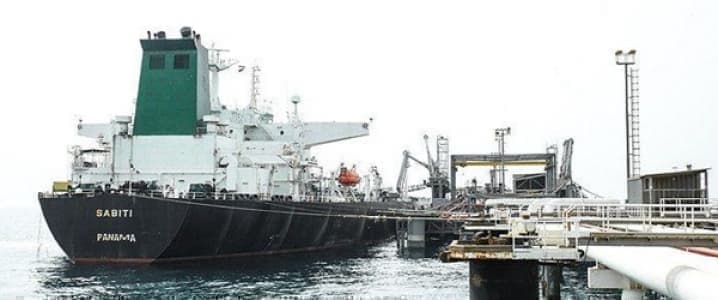Oil prices jumped early on Friday after Iran said that explosions hit one of its oil tankers off the Saudi port city of Jeddah in the Red Sea, damaging the vessel and causing an oil spill that has already been contained.
The price of oil jumped by more than 2 percent as early reports about the explosions started to trickle in. As of 07:00 a.m. EDT on Friday, WTI Crude was up 1.7 percent at US$54.46 and Brent Crude was trading up 1.52 percent at US$60.00, as the geopolitical risk returned to the market.
According to the Islamic Republic News Agency (IRNA), an Iranian tanker, Sabiti, was hit by missiles in the Red Sea early on Friday morning local time. The vessel, which belongs to the National Iranian Oil Company (NIOC), sustained damages to its two major tanks and oil spilled into the sea, according to IRNA. All crew members are safe on board, the news agency said. The tanker is in a stable condition, there is no fire on board, and the oil leak has been stopped, IRNA reported in a later update.
Iran’s foreign ministry confirmed on state television that the tanker Sabiti was damaged in an attack in the Red Sea.
“Those behind the attack are responsible for the consequences of this dangerous adventure, including the dangerous environmental pollution caused,” Reuters quoted Foreign Ministry spokesman Abbas Mousavi as telling Iranian state TV.
This latest incident in the Middle East highlights the increased tensions in the waters surrounding some of the largest oil producing countries in the Middle East. Iran has been recently implicated in several such incidents on the eastern coast of Saudi Arabia—in the Persian Gulf and in the most important oil shipping lane in the world, the Strait of Hormuz.
Tensions in the region further escalated in mid-September with an unprecedented attack on critical onshore oil infrastructure in Saudi Arabia, the world’s top oil exporter and regional rival of Iran.
By Tsvetana Paraskova for Oilprice.com
More Top Reads From Oilprice.com:
- Largest Oil Traders: Oil Prices Aren’t Going Anywhere
- How Much Energy Would It Take To Travel Through Time?
- The Two Most Powerful Oil Men On Earth Set Landmark Meeting



















The United States has an axe to grind against Iran having accused it of being behind the attacks on four tankers off Fujairah, two tankers in the Gulf of Oman and the latest attacks on Saudi oil infrastructure. The United States may have felt it has lost face with Saudi Arabia and the world having threatened Iran with retaliation for the attacks on Saudi oil installations but failed to do so.
The ultimate beneficiary of the attack on the Iranian tanker is the United States. It wants to scuttle the recent tentative steps Saudi Arabia appears to be taking to disengage from the war in Yemen and the US-Israeli axis against Iran and to build bridges of trust with Iran. Another motive is to scuttle any leaning by Saudi Arabia towards more intimate strategic relations with Russia on the eve of President Putin’s visit to Saudi Arabia.
With a changing global geopolitical landscape, Saudi Arabia may feel the need to ally itself with the new rising order that will shape the world in the next two decades, namely Russia’s strategic alliance with China, hence the great importance of President Putin to Saudi Arabia.
The Americans will naturally deny that they were behind the attack because they realize that any retaliation against Iran even a symbolic one will mean war and this will mean in broader terms the end of US national interests in the whole Middle East and huge risk that thousands of US troops in Iraq and in Deir ez-Zur in Syria could be taken hostages or killed. In addition, US naval assets including Aircraft Carries and US military basis including the huge al-Udeid base in Qatar could be within range of Iranian missiles.
The Americans are also aware that Iran strategically dominates the Middle East through its allies in Syria, the Hashd al-Shaabi (Popular Mobilization Units) in Iraq, the Houthis in Yemen, Hizbullah in Lebanon and Hamas in Gaza.
Furthermore, Iran controls the Strait of Hormuz the most vital chokepoint in the world and is capable of blocking it at well. As a result, Iran is capable of pushing oil prices to $140 a barrel impacting adversely on the US economy and costing President Trump the 2020 presidential elections.
Iran is convinced that the US is capitulating and will be soon withdrawing from the greater Middle East, starting with the Persian Gulf, Iraq and Syria and leaving the whole region under Iran’s influence.
Dr Mamdouh G Salameh
International Oil Economist
Visiting Professor of Energy Economics at ESCP Europe Business School, London